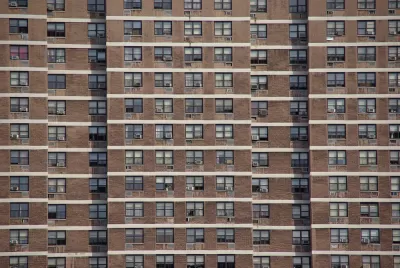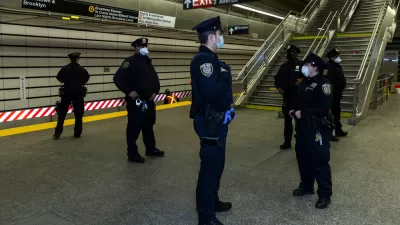Conceived as a stop-gap measure, New York City's cluster site program essentially pays landlords to house homeless people. Now, Mayor de Blasio wants to convert some of those sites directly into affordable units.

Legal obligations require New York to house some of its homeless population, resulting in so-called "cluster sites" in private apartment buildings, with the city footing the bill. The shelter program has been controversial, attracting criticism for its costs, hazards to tenants, and general unsustainability.
However, Nikita Stewart writes, "Under Mayor Bill de Blasio, the city's reliance on the cluster sites has grown along with the rise in homelessness, which has arguably been the biggest failure of his tenure."
Under De Blasio's new plan, announced in December, "the city would use public financing to help nonprofits buy roughly a third of the apartments currently used for the homeless, and then convert the apartments into affordable units, helping the mayor fulfill two goals: lowering homelessness and adding to the city’s affordable housing stock." If landlords refuse to cooperate, eminent domain will apparently be an option.
In the article, Stewart discusses how de Blasio's policy decisions may have contributed to the problem, especially his early reluctance to open new homeless shelters. At the same time, a 2015 report found that cluster site landlords often overcharge the city with impunity. "The lucrative circumstances sometimes led landlords to drive out residents who were not homeless just so they could collect the larger payments from the city."
FULL STORY: De Blasio Seeks to Turn Homeless ‘Cluster Sites’ Into Affordable Housing

Planetizen Federal Action Tracker
A weekly monitor of how Trump’s orders and actions are impacting planners and planning in America.

San Francisco's School District Spent $105M To Build Affordable Housing for Teachers — And That's Just the Beginning
SFUSD joins a growing list of school districts using their land holdings to address housing affordability challenges faced by their own employees.

The Tiny, Adorable $7,000 Car Turning Japan Onto EVs
The single seat Mibot charges from a regular plug as quickly as an iPad, and is about half the price of an average EV.

Seattle's Plan for Adopting Driverless Cars
Equity, safety, accessibility and affordability are front of mind as the city prepares for robotaxis and other autonomous vehicles.

As Trump Phases Out FEMA, Is It Time to Flee the Floodplains?
With less federal funding available for disaster relief efforts, the need to relocate at-risk communities is more urgent than ever.

With Protected Lanes, 460% More People Commute by Bike
For those needing more ammo, more data proving what we already knew is here.
Urban Design for Planners 1: Software Tools
This six-course series explores essential urban design concepts using open source software and equips planners with the tools they need to participate fully in the urban design process.
Planning for Universal Design
Learn the tools for implementing Universal Design in planning regulations.
Smith Gee Studio
City of Charlotte
City of Camden Redevelopment Agency
City of Astoria
Transportation Research & Education Center (TREC) at Portland State University
US High Speed Rail Association
City of Camden Redevelopment Agency
Municipality of Princeton (NJ)




























